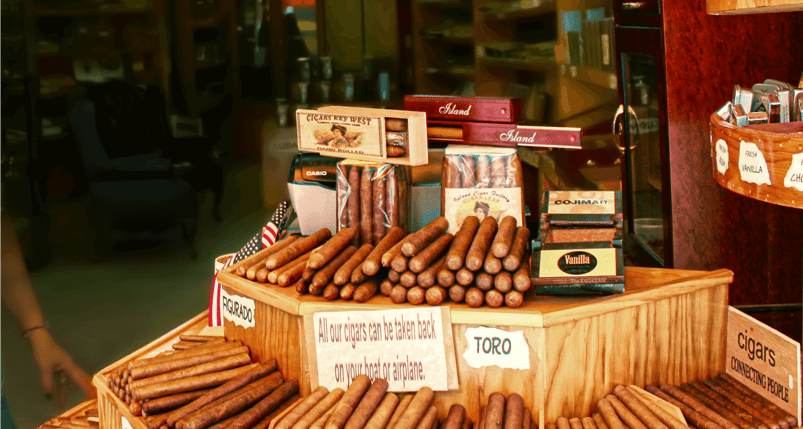ANSWERED: How Profitable Is a Smoke Shop?
Considering opening a smoke shop? Whether you’re a trend-watching entrepreneur or a smoking or vape enthusiast, you need to know one thing before getting started: How profitable is a smoke shop?
Running a smoke shop can be a challenging venture. From navigating complex regulations to staying competitive in a crowded market, smoke shop owners must be strategic and adaptable to succeed. Assuming you get everything right, however, you still need to know how much you can expect to make in this industry.
This post answers the question how profitable is a smoke shop? We’ll talk revenue and operating costs and give tips for how to maximize your profits.
How Profitable Is a Smoke Shop? Average Smoke Shop Revenue
Before understanding how profitable a smoke shop is, you need to know the first half of the profit equation — revenue. How much revenue does the average smoke shop generate each year?
On average, a small, independent smoke shop in the U.S. can expect to generate an annual revenue of approximately $50,000 to $500,000. However, this figure can vary greatly depending on the shop's location, size, and product offerings. Larger smoke shops, particularly those in high-traffic areas, can generate over one million dollars in annual revenue.
Related Read: Are Smoke Shops Profitable? (+5 Ways To Increase Profitability)
Of course, we know that doesn’t mean you’ll be putting a million dollars in your pocket each year. To understand your profits, you’ll need to know what profit margins smoke shops can anticipate.
Smoke shops typically see margins ranging from 20 to 30 percent. Some products, like cigarettes, have relatively low margins of around five percent, whereas some e-cigarette products can have margins over 400 percent.
Where will the majority of your sales come from? Tobacco products, including cigarettes and cigars, are often the primary revenue drivers for smoke shops, accounting for 60 to 80 percent of total sales. However, the growing popularity of vaping has led to an increase in the sales of vaping products and accessories. Some smoke shops report that these products now contribute up to 30 percent of their total sales, and this market is expected to continue growing steadily in the coming years.
You can maximize your revenue by sticking with these trends and carrying popular e-cigarette and vapor products. Additionally, you can expand your offerings to include smoking accessories, CBD products, and general merchandise like soft drinks or snacks. Adding these items can help you attract a bigger customer base and increase your chances of profitability.
With this in mind, let’s dive into the details of the other half of our profitability equation: costs. What are the major costs of operating a smoke shop, and how can you budget for these costs to keep your smoke shop profits high?
Costs of Operating a Smoke Shop
1. Permits, Registrations, and Licenses
The first cost to consider when opening a smoke shop is your permit and license costs. Operating a smoke shop requires various permits, registrations, and licenses to ensure compliance with local, state, and federal regulations. These may include:
- Business license and registration fees: You'll need to register your smoke shop as a legal business entity with your state and local government, which may involve paying fees ranging from $50 to $500.
- Tobacco retailer license: Most states require smoke shops to obtain a specific license to sell tobacco products, which can cost anywhere from $100 to $1,000 or more per year.
- Zoning permits and compliance costs: Depending on your location, you may need to obtain zoning permits to operate a smoke shop in a particular area and ensure that your business complies with all local zoning regulations, which can cost several hundred dollars.
- Health department permits and inspections: Smoke shops may be subject to health department inspections to ensure compliance with regulations related to cleanliness, safety, and proper storage of products, which may involve fees ranging from $100 to $500 or more per year.
For a small smoke shop, you can expect to spend approximately $500 to $1,500 on these initial expenses, with ongoing annual renewal costs of several hundred to a few thousand dollars.
2. Taxes
As a smoke shop owner, you'll be responsible for paying applicable business and retail taxes, including:
- Federal income tax: The federal income tax you'll owe will depend on your business structure and taxable income, which can range from 10 to 37 percent of your profits.
- State income tax: Depending on your state, you may also owe state income tax of upwards of 13 percent of your business profits.
- Local business taxes: Some cities and counties may impose additional taxes on businesses operating within their jurisdiction, adding a few hundred to a few thousand dollars to your annual tax bill.
- Sales tax on products sold: Most states require smoke shops to collect and remit sales tax on their products, ranging from five to 10 percent or more of the sale price.
Related Read: How To Start a Smoke Shop: Your 10-Step Guide to Success
How much will you expect to pay in taxes each year? It's essential to consult with a tax professional to ensure that you're meeting all of your tax obligations and to estimate your tax liability accurately.
3. Equipment and Hardware
To run a successful smoke shop, you'll need to invest in various equipment and hardware, such as:
- Point of sale (POS) system and software: A reliable POS system is essential for processing transactions, tracking inventory, and managing customer data, which can cost anywhere from $1,000 to $5,000 or more, plus a monthly subscription if you pursue an all-in-one, cloud-based solution. Smoke shops should also be looking for POS systems that offer high risk payment processing options.
- Shelving, display cases, and furniture: You'll need to purchase shelving, display cases, and furniture to showcase your products and create an inviting atmosphere for customers, which can cost several thousand dollars or more.
- Humidors for cigars and tobacco products: If you plan to sell premium cigars and other tobacco products that require specific storage conditions, you'll need to invest in high-quality humidors, which can cost anywhere from a few hundred to several thousand dollars.
- Security cameras and alarm systems: To deter theft and ensure the safety of your employees and customers, you may want to install security cameras and alarm systems, which can cost several hundred to a few thousand dollars.
- Computers, printers, and office supplies: You'll need basic office equipment like computers, printers, and various supplies to handle administrative tasks and record-keeping, which can cost a few thousand dollars.
Related Read: The Official Guide to Tobacco POS Systems
For a small smoke shop, you can expect to spend around $10,000 to $20,000 on initial equipment and hardware expenses, with ongoing maintenance and upgrade costs of several hundred to a few thousand dollars per year.
4. Marketing and Advertising
Marketing and advertising are essential for attracting customers to your smoke shop and building brand awareness. Some common marketing expenses include:
- Signage and storefront displays: Eye-catching signage and storefront displays can help draw attention to your shop and communicate your brand identity, which can cost several hundred to a few thousand dollars.
- Print advertising: Flyers, brochures, and other print materials can be effective for promoting your smoke shop locally, with costs ranging from a few hundred to a few thousand dollars per month.
- Online advertising: Social media advertising, Google Ads, and other online marketing channels can help you reach a wider audience and drive traffic to your website or store, with costs ranging from a few hundred to several thousand dollars per month.
- Promotional events and sponsorships: Hosting events or sponsoring local organizations can help build goodwill and generate buzz for your smoke shop, with costs ranging from a few hundred to several thousand dollars per event or sponsorship.
- Website development and maintenance: A professional website can serve as a valuable marketing tool and e-commerce platform for your smoke shop, with development costs ranging from a few thousand to tens of thousands of dollars, plus ongoing maintenance and hosting fees.
Related Read: 3 Tobacco Promotion Ideas for Small Businesses
For a small smoke shop, you can expect to spend around $500 to $2,000 per month on marketing and advertising, depending on your goals and budget.
NOTE: It's crucial to be aware of all laws and regulations governing marketing for tobacco products to ensure compliance and avoid legal issues.
5. Inventory
One of the most significant ongoing expenses for a smoke shop is inventory, which may include:
- Tobacco products: Cigarettes, cigars, pipe tobacco, and other tobacco products will likely make up a large portion of your inventory, with costs ranging from a few thousand to tens of thousands per month, depending on your sales volume and product mix.
- Smoking accessories: Pipes, rolling papers, lighters, and other smoking accessories are essential items for any smoke shop, with costs ranging from a few hundred to a few thousand dollars per month.
- Vaping products: E-cigarettes, vape pens, e-liquids, and other vaping products have become increasingly popular in recent years and can be a significant source of revenue for smoke shops, with costs ranging from a few thousand to tens of thousands of dollars per month.
- CBD and hemp-derived products: Many smoke shops have started carrying CBD oils, edibles, and other hemp-derived products to complement their traditional tobacco offerings, with costs ranging from a few hundred to several thousand dollars per month.
- General merchandise: Snacks, beverages, novelty items, and other general merchandise can help increase impulse purchases and overall sales, with costs ranging from a few hundred to a few thousand dollars per month.
The cost of inventory will depend on the size of your shop, your product mix, and your supplier relationships. For a small smoke shop, you can expect to spend around $20,000 to $50,000 on initial inventory, with ongoing monthly expenses of $5,000 to $10,000 or more.
6. Staffing
Staffing is another significant expense for smoke shops, particularly as your business grows. Staffing costs may include:
- Salaries and wages: The amount you'll pay your employees will depend on their experience, skills, and responsibilities. Hourly wages range from minimum wage to $20 or more per hour for managers and specialized roles.
Related Read: How Much Do Smoke Shops Pay Per Hour?
- Employee benefits: Offering benefits like health insurance, paid time off, and retirement plans can help attract and retain high-quality employees, with costs ranging from a few hundred to several thousand dollars per employee per year.
- Payroll taxes and workers' compensation insurance: As an employer, you'll be responsible for paying payroll taxes and providing workers' compensation insurance for your employees, which can add 10 to 20 percent or more to your overall staffing costs.
- Training and development: Investing in employee training and development can help improve customer service, boost sales, and reduce turnover, with costs ranging from a few hundred to a few thousand dollars per year.
- Background checks and drug screenings: Depending on your location and company policies, you may need to conduct background checks and drug screenings for new hires, with costs ranging from $50 to $200 or more per employee.
For a small smoke shop with two to three employees, you can expect to spend around $4,000 to $8,000 monthly on staffing expenses, with costs increasing as you add more employees and expand your business.
How To Optimize Smoke Shop Profits
Armed with this understanding of the average revenue and costs of smoke shops, let’s now examine some of the ways you can keep your revenue high and costs low, optimizing your smoke shop profits.
Improve Inventory Management
One key aspect of optimizing smoke shop profits is effective inventory management. By closely monitoring your sales data and trends, you can identify which products are moving quickly and which are sitting on the shelves, allowing you to adjust your ordering and stocking practices accordingly. You can access this data using a robust point of sale system with built-in inventory management, reporting, and analytics.
Tailor Your Product Mix
Another important strategy is to offer a diverse product mix that appeals to a wide range of customers. While tobacco products like cigarettes and cigars may be your bread and butter, expanding your offerings to include vaping products, smoking accessories, CBD and hemp-derived products, and even general merchandise like snacks and beverages can help you attract a broader customer base and boost your sales.
Related Read: 4 CBD Inventory Tips for Vape Shop Owners
Provide Excellent Customer Service
Of course, no matter how great your product selection is, it won't mean much if your customer service is lacking. Providing excellent customer service, including friendly and knowledgeable staff, a clean and welcoming store environment, and helpful recommendations and advice, can go a long way in encouraging repeat business and positive word-of-mouth referrals.
Develop a Rewards Program
Another way to incentivize customer loyalty is to develop a rewards or loyalty program. By offering perks like discounts, free products, or exclusive offers to frequent shoppers, you can create a sense of value and appreciation that keeps customers returning. Again, the right point of sale system can help here. A POS solution with built-in loyalty functionality can help you manage these programs without breaking a sweat — or the bank.
Manage Suppliers
Behind the scenes, establishing relationships with reliable suppliers is another key factor in optimizing smoke shop profits. By partnering with suppliers that offer competitive pricing, consistent quality, and dependable delivery, you can ensure that you always have the products you need to keep your customers happy and your sales strong.
How Profitable Is a Smoke Shop? Getting the Most From Your Sales
Throughout this post, we've explored the financial aspects of running a smoke shop, including average revenue, profit margins, and the various costs associated with operating in this industry, ultimately answering the question, how profitable is a smoke shop?
By understanding these factors and implementing the tips and tricks discussed, you can optimize your smoke shop's profit margins and set your business up for long-term success.
However, there's one key tool that every smoke shop needs to truly thrive: a point of sale system designed specifically for the unique needs of smoke shops. Generic POS systems often fall short when it comes to the features and capabilities required to streamline operations, ensure compliance, and maximize profitability in this niche market.
That's where Cigars POS comes in.
Our software is tailored to the needs of smoke shops, offering essential features like:
- Age verification to ensure compliance with regulations
- Customer loyalty programs to encourage repeat business
- Robust inventory management to optimize stock levels and minimize costs
- Advanced reporting to provide insights into your shop's performance
…and more.
Schedule a demo of Cigars POS today and discover how we can help you maximize your smoke shop’s profits today.




